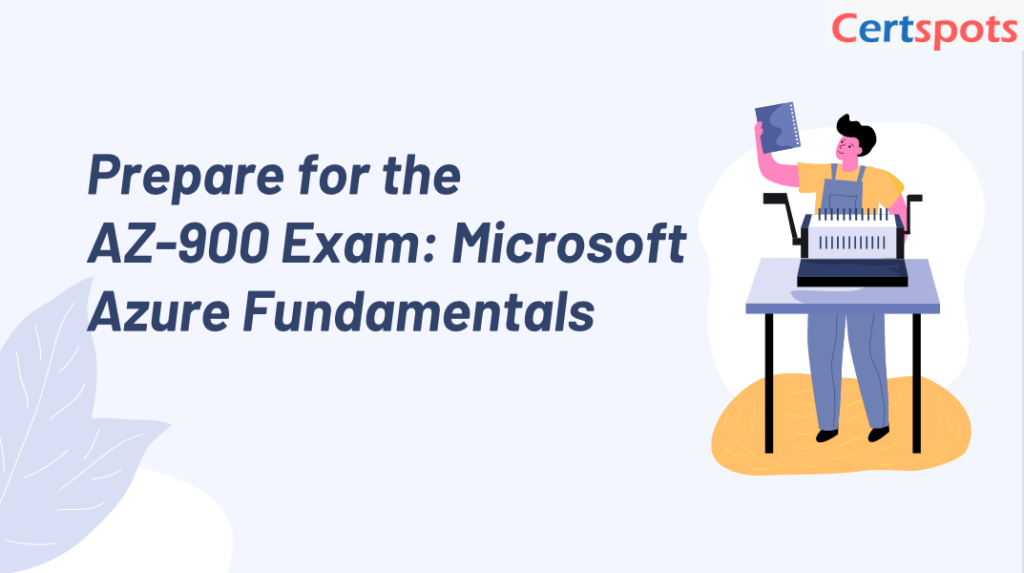Prepare for the AZ-900 Exam: Microsoft Azure Fundamentals
Microsoft Azure Fundamentals (AZ-900) exam is a certification test that validates an individual’s understanding of cloud computing and its core services offered by Microsoft Azure. The exam is designed to test the foundational knowledge of candidates with no prior experience in cloud computing, and it is a recommended entry-level certification for anyone interested in pursuing a career in cloud computing.

In this article, we will provide you with an overview of the Microsoft AZ-900 exam and some tips on how to prepare and pass the certification exam.
Microsoft Azure Fundamentals (AZ-900) Exam Overview
The AZ-900 exam is a 60-minute test that consists of 40-60 questions. The exam measures the candidate’s knowledge of fundamental concepts related to cloud computing and the Microsoft Azure cloud platform. The topics covered in the exam include:
Describe cloud concepts (25–30%)
Understanding differences between Public, private, and hybrid cloud models. A hybrid cloud may be a sort of cloud computing that combines on-premises infrastructure or a private cloud with a public cloud and permit data and apps to move between the two.
Cloud provides services in different categories – Infrastructure-as-a-Service (IaaS), Platform-as-a-Service (PaaS), and Software-as-a-Service (SaaS), and Serverless and not just the Virtual machines. Please refer to these concepts in the figure below.
Understanding the benefits of using Azure and terms around agility, availability, scalability, fault tolerance, disaster recovery, and Capital Expenditure (CapEx) vs Operational expenditure (OpEx)
Describe Azure architecture and services (35–40%)
In this section, you need to prepare basic building blocks of Azure core architectural concepts like regions, resource groups, availability zones, etc. Azure services are offered in regions throughout the world. The azure region is consisting of one or more data centers, also referred to as availability zones. Azure is available in 60+ regions globally. New regions and data centers get added every year. Each Azure region is consisting of one or more data centers, also referred to as availability zones.
Azure has computed services like App services, Virtual machines, containers, Kubernetes, etc.
Azure Storage services have a blob, queue, and table storage, Disk storage, file storage, and Database (SQL/NoSQL) storage like Azure SQL server, MySQL database, Cosmos DB, PostgreSQL, and Azure DB migration services.
Virtual networks, application gateway, and load balancer, firewalls are part of Azure networking services. Some of the questions will be included in the exam around the on-premises network to Azure virtual network integration, Virtual networks, Subnets, Traffic filtering, etc.
Azure service like function app, logic apps, and event grid fall into Serverless computing and also supports other solutions such as the internet of things (IoT), Artificial intelligence, Dev test labs, Big data, analytics, etc.
Azure provides various resource management tools like PowerShell, cloud shell, Azure CLI, and azure advisor.
Describe Azure management and governance (30–35%)
Network security groups (NSG), firewalls, key vaults, and Azure security centers are considered security building blocks in Azure and help to arrange network traffic to and from Azure resources.
Access management for all Azure resources can be managed by using Role-based access control (RBAC), Azure active directory, and multi-factor authentication (MFA).
Azure monitor and service health makes a difference when it comes to execution and accessibility of your applications and proactively distinguishing issues in seconds.
You need to understand the services like Trust center, compliance manager, and terms like ISO, GDPR, Identity Protection policies, Azure data security, etc. to achieve the compliance goal of your organization.
Azure has a service known as Azure Government which is a physically separated instance of Azure to meet the compliance and security standards for US government workloads. Similarly, Azure launched ‘Azure Germany’ to meet German data privacy regulations and rules.
Study Tips To Pass Microsoft Azure Fundamentals (AZ-900) Exam
Here are some tips to help you prepare and pass the Microsoft AZ-900 exam:
Study the Exam Objectives: The first step in preparing for the exam is to study the exam objectives. Make sure you understand the topics covered in the exam and review the official exam objectives provided by Microsoft.
Take Microsoft Azure Fundamentals Course: Microsoft offers a free online course that covers all the topics included in the AZ-900 exam. The course includes videos, hands-on labs, and quizzes to help you prepare for the exam.
Use Practice Tests: Practice tests are an excellent way to gauge your knowledge and identify areas where you need to focus your studies. You can find many free and paid practice tests online.
Hands-on Experience: One of the best ways to learn about Microsoft Azure is to get hands-on experience. Sign up for a free Azure account and try out the different services offered by Azure.
Join Study Groups: Joining a study group can be an excellent way to learn from others and get motivated. You can find many online forums and study groups dedicated to the AZ-900 exam.
Download Latest Microsoft Azure Fundamentals AZ-900 Exam Dumps For Guaranteed Success
Conclusion
In summary, the Microsoft AZ-900 exam is a great entry-level certification for anyone interested in pursuing a career in cloud computing. The exam tests your knowledge of fundamental cloud concepts, Microsoft Azure services, security, pricing, and support models. To prepare for the exam, study the exam objectives, take Microsoft’s free online course, use practice tests, get hands-on experience, and join study groups. With dedication and hard work, you can pass the AZ-900 exam and start your cloud computing journey.



LEAVE A COMMENT